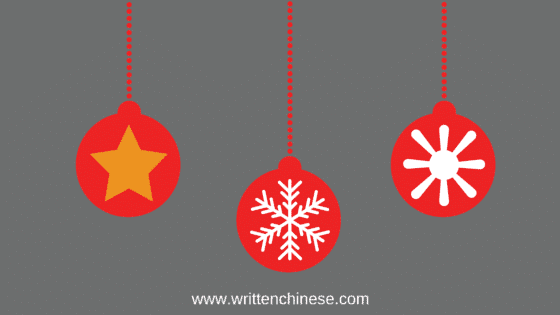To get into the festive spirit, we thought you might like to learn some holiday words in Chinese. Christmas is becoming a popular festival to celebrate here in China, there are Christmas trees, tinsel and even carol singing!
Below, are 8 holiday words to learn, complete with example sentences and links to our dictionary. First, as promised, let’s learn how to say ‘Merry Christmas’ in Chinese.
圣诞快乐 (shèng dàn kuài lè) Merry Christmas
The literal translation of Christmas in Chinese, is the ‘holy birth’. 圣 (shèng) is made up of the radical for earth 土 (tǔ) and right hand 又 (yòu), although the traditional character 聖 (shèng) also included the radical for ear 耳 (ěr).
诞 (dàn) means ‘birth’. 圣诞 (shèng dàn) is also used for the birth of Confucius.
平安夜 (píng ān yè) Christmas Eve
I think the translation for Christmas Eve is a somewhat poetic one, and means ‘Silent night’ or ‘Peaceful Evening’. The character 平 (píng) and the character for apple 苹 (píng) are homophones. So, on Christmas Eve, Chinese people eat apples. The 安 (ān) character depicts a woman 女 (nǚ) under a roof 宀 (mián), suggesting that achieving peace requires a woman within the house. 夜 (yè) contains a person 人 (rén), under a roof 宀 (mián) at night 夕 (xī). You’ll notice that the radical for night appears as a character for New Year’s Eve.
Example Sentence:
每年的平安夜,他的爸爸都会装扮成圣诞老人。(měi nián de píng ān yè, tā de bà ba dū huì zhuāng bàn chéng shèng dàn lǎo rén.) = Every Christmas Eve, his father will dress as Father Christmas.
降临节 (jiàng lín jié) Advent
The Chinese translation of Advent, the period of time before Christmas, is similar to the English meaning. 降临 (jiàng lín) means to ‘descend’ or arrive’.
Example Sentence:
圣诞市集总是自基督降临节起开张,只持续两三天。(shèng dàn shì jí zǒng shì zì jī dū jiàng lín jié qǐ kāi zhāng, zhǐ chí xù tiān.) = The Christmas market always opens at the start of Advent and only lasts a few days.
新年前夕 (xīn nián qián xī) New Year’s Eve
New Year is a very literal translation ‘new’ and ‘year’. Eve, is a combination of the characters ‘former’ and ‘evening’ or the ‘evening before’.
Example Sentence:
我的生日是十二月三十一号,刚好是新年前夕。(wǒ de shēng rì shì shí èr yuè hào, gāng hǎo shì xīn nián qián xī.) = My birthday is on December 31, which happens to be New Year’s eve.
决心 (jué xīn) Resolution
New Year’s Resolutions are a common way to start the new year. In Chinese culture, all decisions are made with the heart, not with the brain, so the addition of 心 (xīn) with 决 (jué) meaning to ‘decide’ reflects the meaning of ‘resolution’, which is often a ‘firm decision’.
Example Sentence:
只要有指引,决心和毅力, 任何目标都可以实现。(zhǐ yào yǒu zhǐ yǐn, jué xīn hé yì lì, rèn hé mù biāo dōu kě yǐ shí xiàn.) = Any goal can be accomplished with determination, guidance and lots of perseverance.
焰火 (yàn huǒ) Fireworks
Whilst fireworks in the west are used for many festive occasions, including New Year’s Eve, in China, fireworks are restricted to Chinese New Year only.
Example Sentence:
今年过年,全城都将放焰火。(jīn nián guò nián, quán chéng dōu jiāng fàng yàn huǒ.) = The whole city will celebrate the New Year with fireworks.
敬酒 jìng jiǔ: toast
Traditionally made during a celebration, the word toast in Chinese combines the character for alcohol 酒 jiǔ and the character for respect and veneration, 敬 jìng.
Example Sentence:
请大家将酒杯斟满,向远方的来客敬酒。(qǐng dà jiā jiāng jiǔ bēi zhēn mǎn, xiàng yuǎn fāng de lái kè jìng jiǔ.)
Please raise your glasses to our guests who have come from afar.
光明节 (guāng míng jié) Hanukkah
光明节 (guāng míng jié) or Hanukkah is literally translated as ‘Bright light festival’.The character 光 (guāng) meaning ‘ray’ or light’ is a partial pictographic character of light, which also features the radical 兀 (wù) meaning ‘to rise’. 明 (明) is a similarly pictographic character containing both the moon 月 (yuè) and the sun 日 (rì). This character also pertains to enlightenment of the mind and the future. An alternative transliteration version of the holiday is 哈努卡 hā nǔ kǎ.
Example Sentence:
光明节是一个在十二月庆祝的为时八天的犹太教节日。(guāng míng jié shì yī gè zài shí èr yuè qìng zhù de wéi shí bā tiān de yóu tài jiào jié rì.) = Hanukkah is an eight-day Jewish holiday in December.
